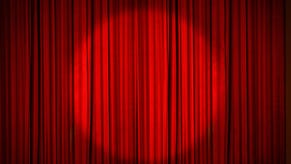The Legend of Zelda: Echoes of Wisdom - a brilliant game marred by performance problems
Link's Awakening's unbeatable foe returns: unstable frame-rates.
As the Switch coasts into its final years, I think it's worth stepping back and considering just how many Legend of Zelda games the console has received since its launch in 2017. Despite the deluxe, each and every title manages to feel fresh - and that is doubly true with The Legend of Zelda: Echoes of Wisdom. For the first time since the early 90s, players assume the role of Princess Zelda rather than Link, but this isn't just the usual character swap. Instead, this change results in a dramatically different kind of experience that demands creativity and experimentation from the player.
One look at the game, though, and it's easy to draw comparisons to the 2019 remake of Link's Awakening. That's because this new game seems to have been constructed using technology and techniques that powered that adventure, meaning developer Grezzo is back at the helm. That game, however - as good as it was - was plagued by performance problems and the unfortunate reality is that nothing's changed here. Indeed, the fluctuating frame-rate problems may be even more pronounced.
Looking at the many positives though, one of the first things I love about Echoes of Wisdom is found in its introduction. A lively sequence effectively sees Link pass the gameplay baton over to Princess Zelda itself, with events culminating in our heroine emerging into the outside world, where it becomes evident that you're standing atop a version of Hyrule derived from the Super NES game, A Link to the Past.
Despite the similarities between the map layout, the actual placement of everything and size feels very different. While certain landmarks do line up, the overall lie of the land is quite different and the map itself is massively expanded. I think the developer has found an excellent balance here in that you get those winks and nods referencing the Super NES game yet it all still feels decidedly new and different.
This is in stark contrast to Link's Awakening, which sought to recreate the Game Boy game on new hardware. In that game, on Game Boy, limited memory meant that every wall was limited to 90 degree angles. There were no slopes or more varied terrain as we saw in A Link to the Past. Echoes of Wisdom embraces these features but takes things even further with complex terrain that can even require utilizing magic to traverse. Echoes of Wisdom also does away with the traditional barriers - you know, things like being unable to swim in deep water. Zelda can perform all these actions right from the beginning which changes how you approach exploration. It's interesting stuff.
What I didn't expect, however, was a shared villain between Link's Awakening and Echoes of Wisdom - I had hoped that Link might have defeated it once and for all but, unfortunately, the true face of evil remains: the lord of darkness, unstable performance. Essentially, the problems I highlighted in the Link's Awakening review have returned in full force, with frame-rate bouncing harshly and obviously between 30fps and 60fps, likely down to a reliance on double-buffered vertical sync. It's exactly the behaviour observed in Link's Awakening but this time it's even worse.
The first thing to consider is that the actual game world itself is much larger than Link's Awakening and more complex. Given that it's so seamless, it's perhaps unsurprising that the Switch struggles, but it's where it struggles that remains fascinating. It's not just a case that the GPU is too slow, rather, it seems more like a memory bandwidth issue while streaming data. Most of the time, when the frame-rate dips, if you stop in place and use the right stick to move the camera, you'll find that it jumps right back up to 60fps. Once you begin to run again, however, it crashes down to 30fps. So, some of the issues are triggered by moving through the world - possibly streaming level data.
The frame-rate is constantly going up and down as you play - so much so that it almost feels like they should have at least included the option to cap it at 30 frames per second if you were so inclined. This can certainly have a detrimental effect on some sections, though. The sand boss, for instance, in the second major dungeon I tackled, required some experimentation to figure out the right solution but the issue is that every time the boss unleashes its powerful attacks, the frame-rate plummets. To me, it takes away some of the joy of experimentation in a moment when you need that performance.
That said, while the overworld and large encounters are often 30fps with random pockets of 60fps - dungeons are mostly 60fps with occasional 30fps hiccups. Basically, most of the gameplay outside of the overworld is smooth overall. It really is a game of two halves in that sense. This raises the question then - will it bother you, the player? If you were annoyed by the issues in Link's Awakening, well, it is not better here. If you had no issues with that game, you'll likely be OK with it.
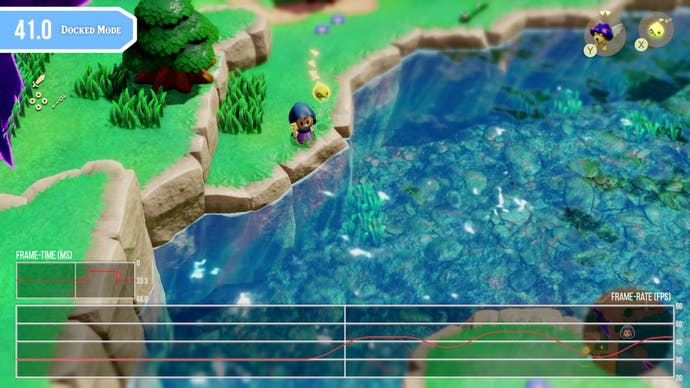
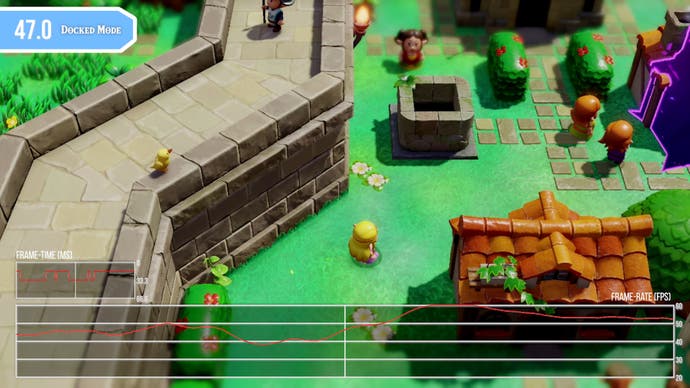
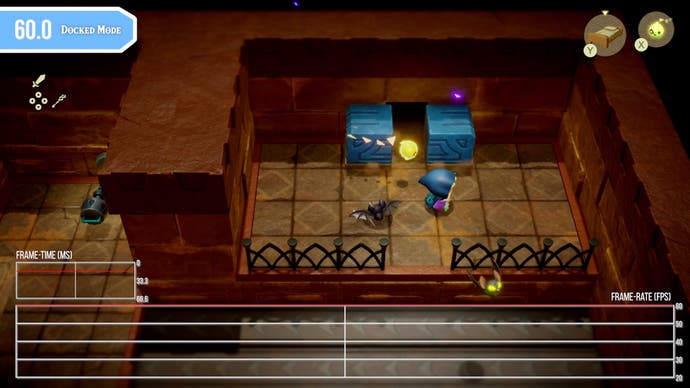
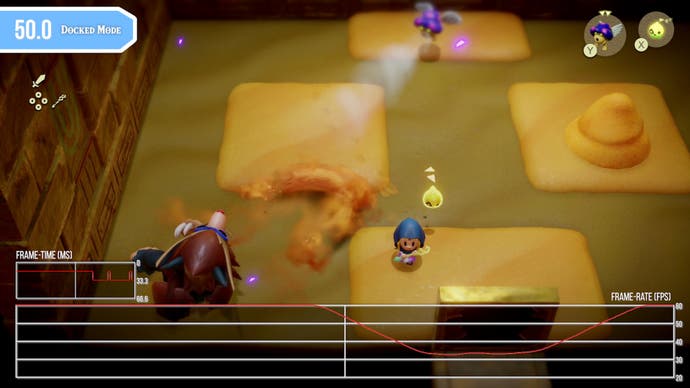
The thing is - the surrounding game is otherwise so extremely well made and interesting that you might be able to tolerate these problems and just enjoy the game. It's not just that you play as Zelda, rather, it's what Zelda is capable of that makes it unique. Everything from combat to navigation to puzzle solving relies on Zelda's ability to summon objects and characters with the flick of her staff. As you progress, you'll be able to memorise objects and add them to your collection. It has Breath of the Wild-like freedom, only within a more focused level design.
The key here is that puzzles do not necessarily have a singular solution and you can use your freedom to come up with creative ways to solve such challenges. The combat has elements of this too - you'll often summon creatures to do your bidding as you step back, lending it a strategic feel. That's not to say you can't engage in classic sword combat - there is a mechanic for this - but you'll spend most of your time putting your vast inventory to use. When considering the amount of stuff you can spawn and the massive increase in world size, it's no wonder that Echoes of Wisdom struggles to deliver a stable frame-rate. There's just a lot going on per scene in pursuit of this flexibility.
Then there's image quality. Here, we're seeing the same metrics as Link's Awakening. Indoor scenes typically range between 972p up to native 1080p but once outdoors, the resolution can drop to as low as 720p, so it is quite variable based on load. It has the same behaviour as Link's Awakening too: when you leave a building, for instance, outdoor image quality starts at 1080p and then drops over the course of a few frames. I would say image quality is generally good overall though.
The rest of the visuals very much follow in the footsteps of Link's Awakening Remake as well. You get the same tilt-shift perspective with depth of field creeping in along the edges, the same chibi-sized characters running around the world and more. The main difference this time stems from the more complex world. The walls are no longer constrained to 90 degree angles and there are slopes in the terrain. All this is to say that I think the game looks excellent overall - I'm still a big fan of the visual design and feel it's a good choice for a game like this. It really is just the frame-rate woes that I take issue with. Now more than ever, it feels like it's time for a Switch successor - and if backwards compatibility adds extra horsepower to sort this game's issues, all the better.
In summary, I enjoyed my time with this game and plan to see it through to the end. The fun of experimentation is a triumph, empowering players to solve puzzles as they choose rather than following a fixed formula. It keeps the spirit of the series alive while presenting a decidedly different take on it. Echoes of Wisdom doesn't push any visual boundaries but still manages to be an attractive, clean looking game.
However, it's not simple to brush aside its performance problems. Nintendo-published games this generation have largely managed to deliver solid, consistent frame-rates, often beyond what one would expect, but I feel like Grezzo's goal for this game was simply too much for the Switch as we know it today. And it's a shame because that's really the only major flaw here. The rest of this game is interesting and unique. I'm really impressed with what the team has achieved here in terms of design. I've got to say, I wasn't even completely sold on it initially - the first couple hours contain a lot of bed stacking and flailing around but once you start to obtain more usable items, the joy of the game becomes clear.




